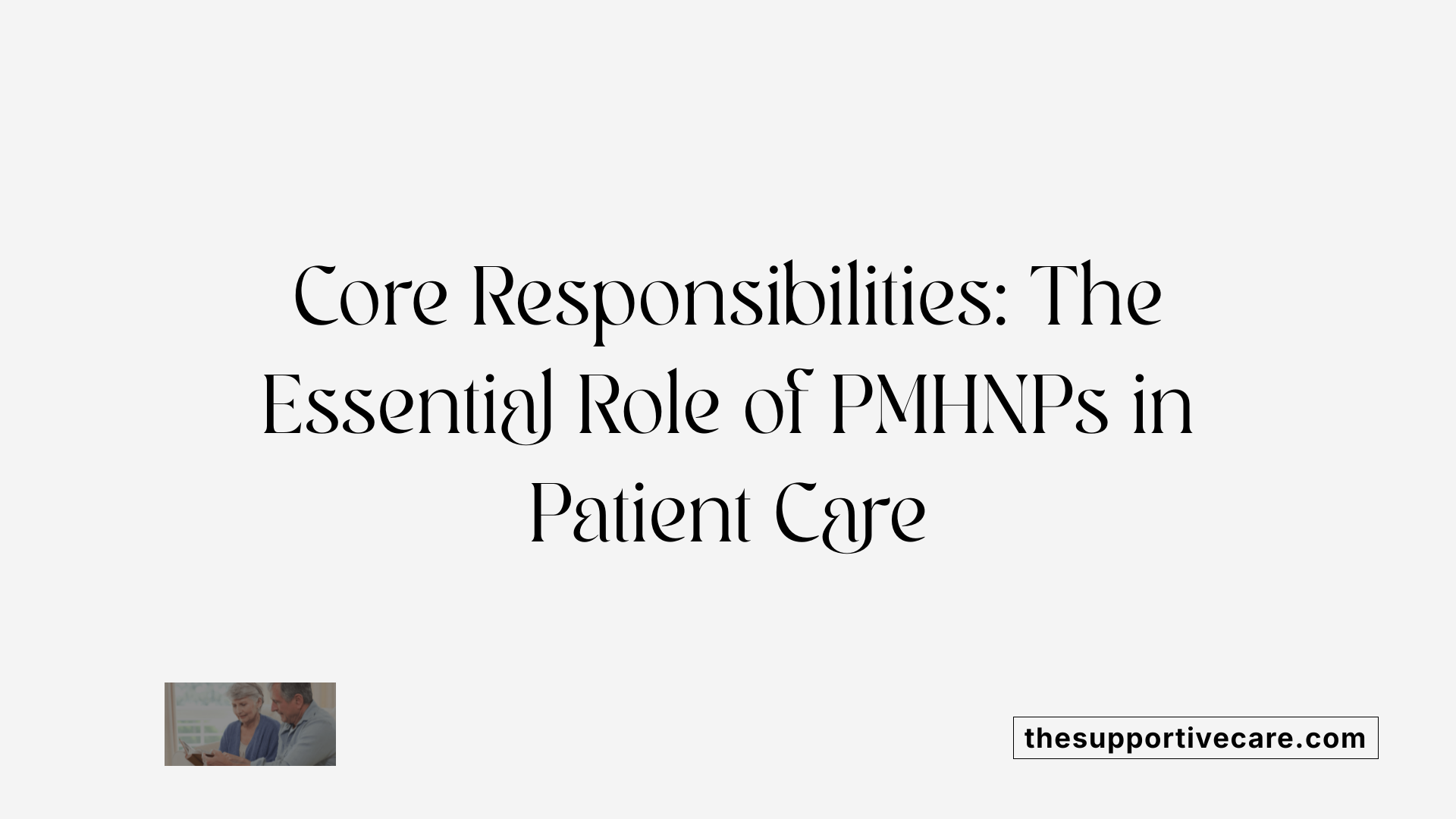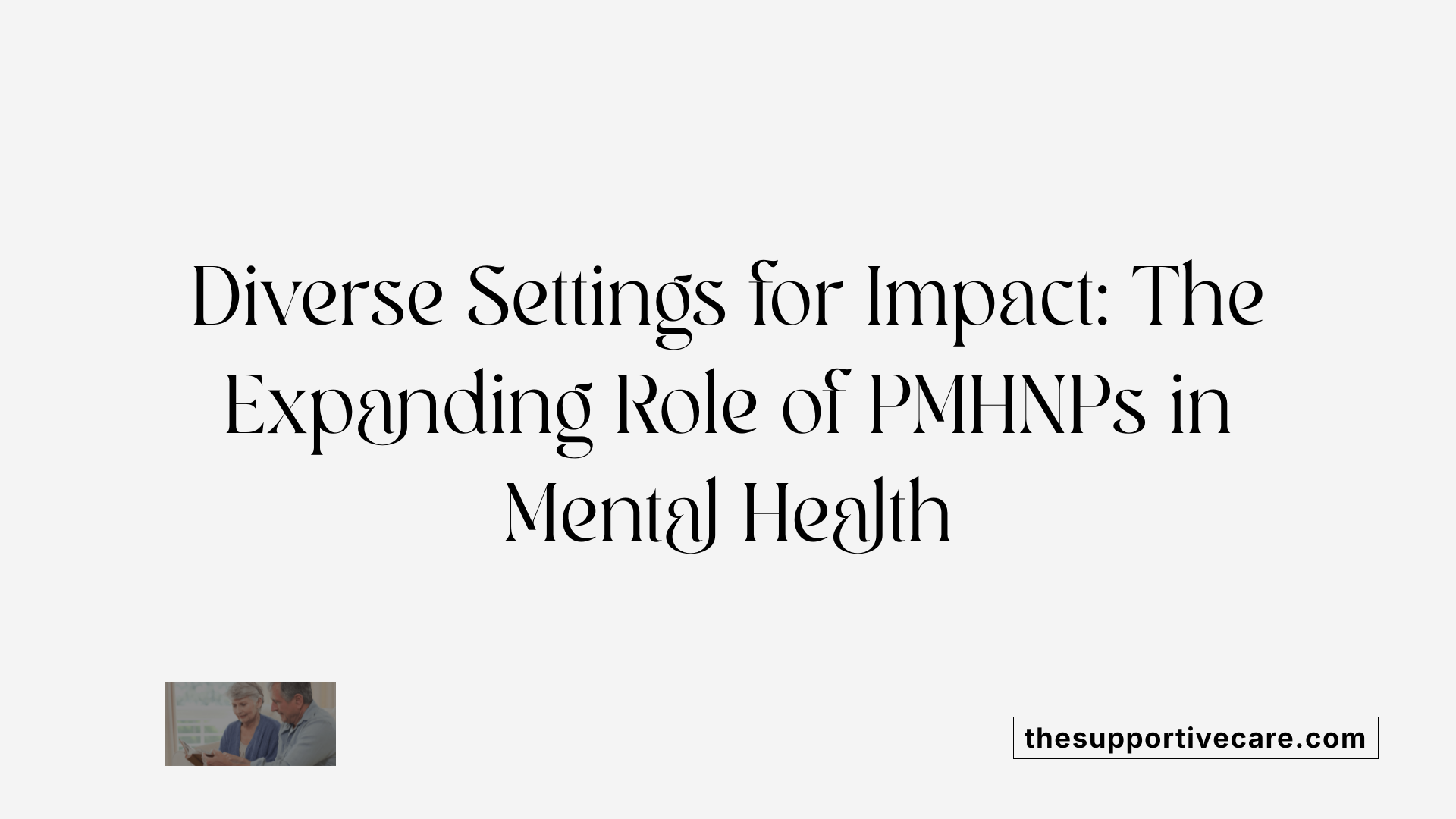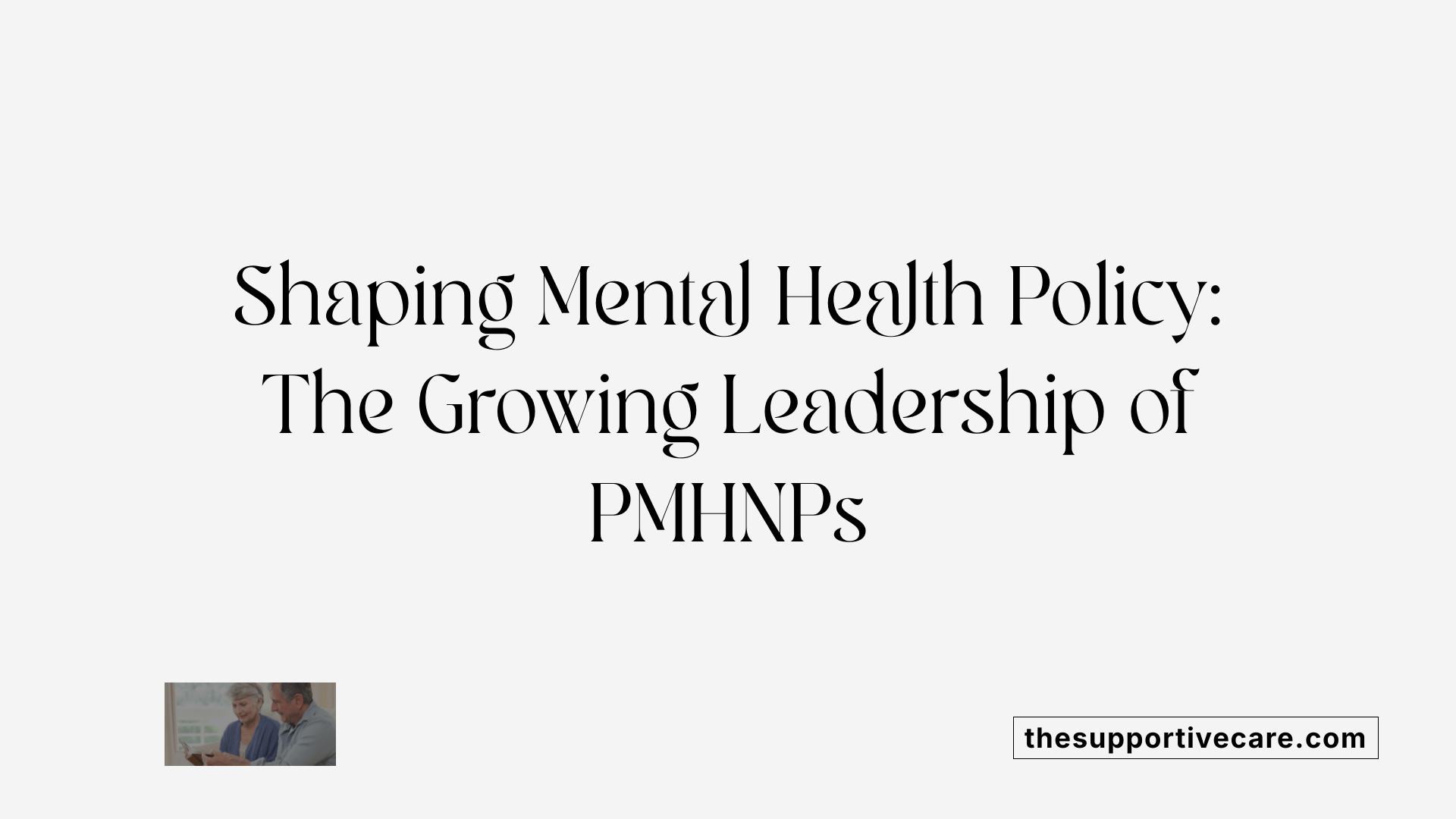Understanding the Vital Role of Psychiatric Nurse Practitioners
Psychiatric nurse practitioners (PMHNPs) are increasingly recognized as key providers in facility-based mental health care. Their specialized training, broad scope of practice, and ability to work across various settings position them as crucial to addressing the mental health treatment gap, especially amid workforce shortages and the rising demand for mental health services. This article explores their roles, training, settings, and future leadership opportunities within mental health treatment environments.
Scope of Practice and Core Responsibilities of PMHNPs

What are the clinical training requirements for psychiatric nurse practitioners?
Psychiatric nurse practitioners (PMHNPs) must complete comprehensive educational programs culminating in a master's or doctoral degree in psychiatric-mental health nursing from an accredited institution. These programs involve intensive coursework covering advanced physiology, patient assessment, psychopharmacology, psychotherapy modalities, and clinical rotations. Trainees typically accrue between 500 to 1,000 supervised clinical hours in diverse mental health settings such as outpatient clinics, hospitals, community health centers, and residential facilities. Training emphasizes holistic, patient-centered, trauma-informed approaches integrating biological, psychological, social, and environmental factors. Certification standards set by the American Nurses Credentialing Center (ANCC) require passing a rigorous exam, and ongoing continuing education ensures maintenance of licensure and competency. This blend of academic rigor, practical experience, and certification preparation equips PMHNPs to manage mental health conditions across different populations and settings.
In what healthcare settings do psychiatric mental health nurse practitioners work?
PMHNPs work across a broad spectrum of healthcare environments. They are found in hospitals, outpatient clinics, private practices, community health centers, correctional facilities, schools, and military healthcare systems. Many provide telehealth services, expanding access to underserved and rural populations. Some serve in emergency departments, residential substance abuse programs, domestic violence shelters, nursing homes, and forensic or juvenile justice settings. They are integral to integrated primary care models, addressing mental health needs within general health services. Their specialized roles include assessment, diagnosis, treatment, medication management, psychotherapy, and care coordination tailored to diverse patient groups such as children, adolescents, adults, and seniors. The wide range of settings demonstrates their flexibility and essential contribution to expanding mental health care access and quality.
What is the role of a psychiatric nurse practitioner in mental health care?
A PMHNP is an advanced practice nurse dedicated to mental health across the lifespan. Their core responsibilities include evaluating, diagnosing, and treating mental health conditions through evidence-based methods. They prescribe medications, conduct psychotherapy sessions, and monitor treatment responses to optimize care. PMHNPs often work collaboratively within healthcare teams in hospitals, outpatient clinics, schools, and community settings, addressing issues like depression, anxiety, schizophrenia, and substance use disorders.
Beyond clinical duties, PMHNPs focus on holistic well-being, considering emotional, social, and environmental factors influencing mental health. They engage in patient education, promote self-care, and serve as advocates for reducing stigma. In underserved areas, especially where psychiatrist shortages are acute, PMHNPs serve as accessible frontline providers, expanding mental health services and ensuring timely interventions.
Can psychiatric nurse practitioners provide psychotherapy and prescribe medication?
Yes, psychiatric nurse practitioners are fully capable of providing psychotherapy and prescribing medications. Their clinical training encompasses psychotherapeutic techniques such as cognitive-behavioral therapy (CBT), trauma-informed care, motivational interviewing, and others. They are credentialed and licensed to diagnose mental health conditions, develop treatment plans, and implement both pharmacological and non-pharmacological interventions.
Their ability to integrate psychotherapy with medication management allows PMHNPs to deliver comprehensive, patient-centered care. Depending on state regulations and practice settings, they may practice independently or in collaboration with psychiatrists and other healthcare professionals. This dual capacity enhances access to mental health services by allowing them to manage a wide range of conditions effectively.
What is the significance of psychiatric nurse practitioners within mental health treatment teams?
PMHNPs are vital to mental health treatment teams, bridging psychiatric expertise with nursing skills to deliver holistic care. Their roles include conducting psychiatric evaluations, diagnosing mental health disorders, managing psychotropic medications, providing psychotherapy, and responding to psychiatric crises. Their presence expands the capacity of mental health services, particularly in areas facing psychiatrist shortages.
PMHNPs support team-based care models, working alongside physicians, social workers, psychologists, and primary care providers to deliver coordinated services. Their holistic approach considers biological, psychological, and social factors, enabling personalized treatment plans. By doing so, they improve clinical outcomes, increase access to care, and reduce treatment gaps in various populations and settings.
What are the career and leadership opportunities for psychiatric nurse practitioners?
PMHNPs have numerous opportunities for advanced practice, leadership, and policy development. They can serve as clinical leaders, educators, advocates, and policymakers, shaping the future of mental health care. Many states grant full practice authority, allowing PMHNPs to operate independently, which enhances their leadership capacity.
They often take on roles in healthcare management, project leadership, and health policy development, influencing systemic change. Their increasing numbers—over 43,000 nationally—and expanding scope reflect a vital shift toward nurse-led mental health services. Career paths include specialized clinical roles, teaching at academic institutions, participating in research, and contributing to mental health policy reforms. These opportunities enable PMHNPs to influence practice standards, improve access, and promote mental health awareness on a broad scale.
| Aspect | Details | Additional Information |
|---|---|---|
| Clinical training | Master’s or Doctorate in Psychiatric-Mental Health Nursing | Includes coursework, clinical hours (500-1,000), certification prep |
| Practice settings | Hospitals, clinics, schools, correctional facilities, telehealth | Wide-ranging environments to serve diverse populations |
| Core responsibilities | Diagnosing, prescribing, therapy, care coordination | Holistic and patient-centered approach |
| Prescriptive authority | Yes, in most states | Administer medications, monitor effects |
| Collaboration | With physicians, social workers, health teams | Ensures comprehensive care |
| Career paths | Clinical leadership, academia, policy | Growing role in mental health expansion |
This information emphasizes the crucial role that PMHNPs play in addressing the mental health care gap through diverse roles, settings, and leadership opportunities, ultimately improving outcomes for a wide range of patients.
Training and Competency Development for PMHNPs

What are the clinical training requirements for psychiatric nurse practitioners?
Psychiatric nurse practitioners must complete a rigorous educational pathway that combines academic coursework with extensive clinical practice. They earn a master's or doctoral degree in psychiatric-mental health nursing from an accredited institution. Their coursework covers advanced physiology, health assessment, psychopharmacology, and psychotherapeutic methods.
Clinical rotations constitute a critical component of their training, requiring around 500 to 1,000 supervised hours across diverse settings, such as outpatient clinics, hospitals, and community health centers. These rotations emphasize holistic, trauma-informed, patient-centered care integrating biological, psychological, social, and environmental factors.
Candidates are also required to fulfill certification prerequisites, which include passing the ANCC board certification exam and completing continual professional education to maintain licensure. The entire training process is designed to prepare PMHNPs to assess, diagnose, and treat mental health conditions across populations, ensuring they are competent and ready for independent practice.
Overall, the pathway to becoming a PMHNP balances academia, practical experience, and certification preparation to develop expertise necessary for effective mental health care delivery.
How does certification and ongoing education enhance a PMHNP's clinical practice?
Certification by the American Nurses Credentialing Center (ANCC) plays a pivotal role in validating a PMHNP’s skills and knowledge. It involves passing a comprehensive exam that assesses competencies in mental health assessment, diagnosis, medication management, and psychotherapy.
Beyond initial certification, ongoing education is essential. It ensures PMHNPs stay current with the latest evidence-based practices, treatment guidelines, and therapeutic innovations. Continuous learning fosters clinical excellence, supports quality patient outcomes, and promotes adaptability in a rapidly evolving mental health landscape.
Engaging in professional development opportunities also enhances leadership capabilities, encourages policy involvement, and supports the development of innovative care models. As mental health needs grow and diversify, ongoing education equips PMHNPs to meet complex challenges, advocate effectively for patients, and lead advancements in service delivery.
What specializations and advanced training opportunities are available for PMHNPs?
To address varied mental health needs across different populations, PMHNPs can pursue additional specialization. Fields include child and adolescent mental health, geriatrics, trauma recovery, addiction, and developmental disorders.
Specialization pathways often involve focused coursework, supervised clinical practice in relevant settings, and, in some cases, fellowships or residencies that deepen expertise. These advanced tracks enable PMHNPs to serve complex cases, develop tailored treatment strategies, and assume leadership roles within their specialties.
The pursuit of advanced training highlights a continuous commitment to professional growth, ensuring that PMHNPs can provide expert care for diverse patient groups. It fosters the development of nuanced, developmentally appropriate, and culturally sensitive interventions aligned with current best practices.
| Training Component | Focus Area | Additional Notes |
|---|---|---|
| Academic Coursework | Advanced Physiology, Assessment, Pharmacology | Foundational knowledge for practice |
| Clinical Rotations | Outpatient, Inpatient, Community Settings | 500-1,000 hours, emphasizing holistic care |
| Certification Exam | Mental Health Expertise | ANCC credentialing process |
| Continuing Education | Emerging Practices | Updates in treatment guidelines and modalities |
| Specialization Programs | Child & Adolescent, Geriatric, Trauma, Addiction | Focused training, often with fellowships |
This structured training approach ensures that PMHNPs are well-equipped to meet the complex and diverse needs of their patients, helping to bridge gaps in mental health care access and quality.
Practice Settings and Public Health Contributions of PMHNPs

In what healthcare settings do psychiatric mental health nurse practitioners work?
Psychiatric mental health nurse practitioners (PMHNPs) operate across a broad spectrum of healthcare environments. They are commonly found in hospitals, outpatient clinics, private practices, community health centers, and specialized psychiatric facilities. Beyond these traditional settings, they serve in correctional institutions, schools, juvenile justice systems, emergency departments, residential substance abuse programs, domestic violence shelters, nursing homes, and military healthcare facilities.
A growing trend involves providing services through telehealth platforms, which significantly expands access to mental health care, especially in remote or underserved areas. PMHNPs focus on evaluating, diagnosing, and managing mental health conditions, prescribing medications, delivering psychotherapy, and coordinating care tailored to the diverse needs of populations ranging from children to seniors.
This versatility in work environments underscores their critical role in bridging gaps in mental health services and addressing the unique needs of various community settings, ensuring comprehensive care beyond traditional clinic walls.
Policy, Workforce Trends, and Leadership Roles of PMHNPs

What are the policy implications for the scope of practice of psychiatric nurse practitioners?
Current legislative and regulatory standards often restrict the full utilization of PMHNPs’ training and skills. These limitations impede their ability to independently diagnose, treat, prescribe, and provide psychotherapy without physician oversight. The push for full practice authority laws aims to eliminate these barriers, enabling PMHNPs to operate at the top of their scope. States like New Hampshire exemplify progressive policy changes that have expanded PMHNP roles, including authority to manage involuntary admissions, long-term psychiatric commitments, and treatment plans autonomously. Such reforms are essential for integrating PMHNPs into healthcare leadership, improving access to mental health services, and addressing the ongoing workforce shortages. Policy shifts that support independence and expanded responsibilities for PMHNPs significantly enhance mental health system capacity, especially in underserved areas, fostering greater health equity and quality of care.
How does workforce growth influence mental health service delivery?
The number of PMHNPs has increased dramatically, with a 134.1% rise from 2013 to 2019, reflecting efforts to bridge the gap caused by a severe shortage of psychiatric providers. Despite this growth, many rural and underserved regions continue to lack sufficient mental health professionals, highlighting an ongoing need for expanded roles. The integration of PMHNPs into primary care settings, telehealth platforms, and community-based services has been pivotal in enhancing access to mental health care.
Projections indicate a shortfall of approximately 250,000 mental health professionals by 2025. The expanding role of PMHNPs is vital to mitigating this deficit. They help reduce treatment delays, increase appointment availability, and extend care to diverse populations. Their capacity to provide comprehensive mental health services, especially in primary and underserved settings, makes them indispensable to broadening access, improving health outcomes, and decreasing disparities across the nation.
What leadership opportunities do PMHNPs have in shaping mental health policies?
PMHNPs are increasingly recognized as leaders and advocates in the evolving landscape of mental health care. Their advanced education and clinical experience position them to influence healthcare policies, develop innovative models of service delivery, and participate in workforce planning efforts.
Many PMHNPs serve as educators, researchers, and policy advisors, promoting evidence-based practices and supporting legislative reforms that expand their scope of practice. Their leadership is critical in addressing mental health disparities, fostering integration of behavioral health into primary care, and championing community resilience initiatives.
Strengthening their roles through continuous professional development and policy advocacy is necessary for transforming mental health systems into more accessible, sustainable, and equitable platforms of care. By spearheading policy reforms and community initiatives, PMHNPs can push forward systemic changes that ensure all populations receive timely and appropriate mental health services.
| Aspect | Details | Impact |
|---|---|---|
| Scope of Practice | Restrictive regulations limit independent practice | Hinders full utilization of skills |
| Full Practice Authority | Laws allowing independent operation | Improves access, workforce efficiency |
| Workforce Growth | 134.1% increase (2013-2019) | Addresses provider shortages |
| Geographic Distribution | Increased roles in rural/underserved areas | Reduces disparities |
| Leadership & Advocacy | Educators, policy advisors, community leaders | Shapes future healthcare policy and models |
Expanding the scope, supporting workforce growth, and fostering leadership among PMHNPs are essential steps toward a resilient and inclusive mental health system. These strategies promise better population health outcomes, increased access, and the creation of innovative care models aligned with national health priorities.
The Future of Facility-Based Mental Health Care
As mental health challenges continue to rise globally, psychiatric nurse practitioners are positioned at the forefront of care delivery. Their expanding scope, diverse practice settings, and leadership potential make them indispensable in bridging gaps within facility-based mental health services. To fully realize their contributions, policy reforms advocating full practice authority and continuous education are crucial. By leveraging their skills and community outreach capabilities, PMHNPs can significantly influence the evolution of mental health care, ensuring comprehensive, accessible, and patient-centered services for all.
References
- The role of psychiatric mental health nurse practitioners in improving ...
- What Does a Psychiatric Nurse Practitioner Do?
- Psychiatric-Mental Health Nursing
- What Does a Psychiatric Nurse Practitioner Do?
- Are You Considering a Career as Psychiatric Mental Health Nurse ...
- Psychiatric Nurse Practitioners as Leaders in Behavioral Health ...
- Psychiatric Mental Health Nurse Practitioners and the Future of ...
- Where Do Psychiatric-Mental Health Nurse Practitioners Work?



































































































